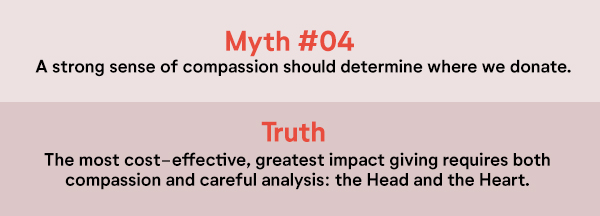
“A good head and good heart are always a formidable combination.”
– Nelson Mandela –
If you are reading this newsletter, you likely use both your heart and your head to guide your donations. Your heart inspires you to help people much less fortunate than yourself, and your head guides your decisions about how best to help. But what about your family, your friends, and your wider community?
Very likely, they do not make donation decisions like you do.
According to the most comprehensive study on charitable giving to date — “Money for Good II,” led by Guidestar and Hope Consulting and funded in part by The Bill and Melinda Gates Foundation — only 16% of donors list “high impact” as the primary motivation for their giving. Other motivations include:
-
supporting organizations that have had a direct impact on yourself or your loved ones (23%);
-
giving to well-known organizations because it isn’t complicated (18%);
-
supporting a faith-based organization (16%);
-
supporting local organizations where people can “see the difference” their contributions make (13%); and
-
giving to organizations where you are personally connected (14%).
We need your help spreading the word about the importance of cost-effective, high-impact philanthropy that uses both the heart and the head. You can multiply your influence significantly if you are willing to share the book, discuss the major points in the book, share your own giving journey, and have zoom meetings to discuss the book.
|
